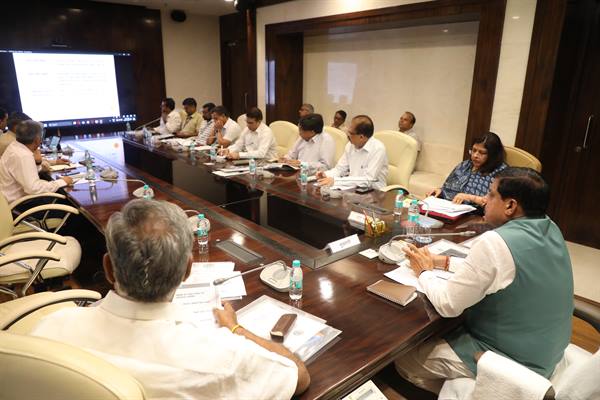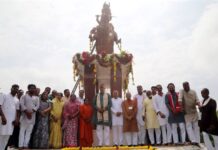Empowerment of Tribal Communities through Implementation of PESA Act
Chief Minister apprises himself About PESA Act Implementation and Activities
Chief Minister Dr. Mohan Yadav has said that in the districts of the state where the PESA Act is applicable, local tribals should be linked to new areas of employment. He called for tribal-dominated Panchayats to explore opportunities in fields such as cottage and village industries, animal husbandry, mushroom cultivation, lacquerware, honey production, silkworm rearing, and textile manufacturing. Dr. Yadav also instructed the formulation of action plans to ensure the effective implementation of these initiatives. Furthermore, he directed officials to assess the feasibility of assigning rural transport responsibilities to tribal-dominated Panchayats, with a detailed report to be prepared accordingly.
Chief Minister Dr. Yadav conducted a review of the PESA Act implementation and related activities in the state at Mantralaya on Wednesday. He instructed officials to conduct a study and prepare a report on the feasibility of entrusting the rural transport service responsibilities to youth from the tribal community.
Panchayat and Rural Development Minister Shri Prahlad Patel and Minister of State for Panchayat and Development Smt. Radha Singh, Chief Secretary Smt. Veera Rana, Additional Chief Secretary Chief Minister’s Office Dr. Rajesh Rajoura, Additional Chief Secretary Panchayat and Rural Development Shri Malay Kumar Srivastava, Additional Chief Secretary Forest Shri Ashok Varnwal, Principal Secretary to the Chief Minister Shri Sanjay Kumar Shukla and concerned senior officers were present as well.
Chief Minister Dr. Yadav instructed to explore the prospect of forming a tribal battalion during a meeting. The discussions highlighted that tree plantations in Maharashtra have connected the tribal community with employment opportunities. Tribal-dominated Panchayats could also engage in tourism development and managing cow sheds. The meeting showcased achievements across districts where tribal communities resolved issues through consensus, aided by peace and dispute redressal committees under the PESA Act. Additionally, Madhya Pradesh has been designated by the Central Government as the nodal state for crafting a vision document to regulate money lending practices. The PESA Act covers 88 development blocks across 20 districts in Madhya Pradesh, encompassing 5,133 gram panchayats and 11,596 villages.
Chief Minister Dr. Yadav directed that the difficulties faced in the process of providing caste certificates to the tribals living in cities should be properly resolved at the departmental level. It was informed in the meeting that in Narmadapuram and Betul districts, efforts have been increased to connect the people of the tribal community with cottage industries and the work of collecting tendu leaves is being conducted on a large scale by the Gram Sabhas.
During the meeting, it was noted that significant efforts have been undertaken under the PESA Act to empower the Gram Sabha. For instance, the Gram Sabha of Hirde Nagar in Mandla district received an income of Rs 62 lakh 38 thousand, earmarked for various village development projects. Additionally, in Gram Sabha Kudwat of Alirajpur district, a proposal was ratified within the Gram Sabha for the administration of a new market, now named Birsa Munda Square.
In Balaghat district, tendu leaf collectors have achieved economic upliftment with payments exceeding the prescribed Rs 3,000 per standard bag. Twenty committees in the district are actively engaged in tendu leaf collection, having completed over 62 percent of the collection work. Efforts are underway to integrate tribal community members into cottage industries in Narmadapuram and Betul districts. Moreover, in village Hindalli of Betul district, the Gram Sabha has formulated an action plan to preserve ancient traditions, specifically focusing on Pola and Meghnath Mela celebrations.
It was informed in the meeting that along with state-level, and district-level training, PESA training workshops have been organized at the sector level also. In the state-level PESA training workshop, experts from Maharashtra’s Institute of Tribal Ethos and Economic Research (TEER) provided training. District-level PESA training has been conducted in 16 training centers in the state. About 800 trainers were prepared from this. Trained trainers at the district level are giving training at the development block and sector level.
Information was given in the meeting that under the traditional culture of the tribal class in the state, peace, and harmony will be achieved in the tribal-dominated areas along with the right to conduct Gram Sabhas, empowerment of the tribal class, their economic assistance, stopping exploitation, conservation of water, land, and natural resources. From the security point of view, much has been achieved. With the implementation of the PESA Act, Extension Act 1996 in the Panchayat area, and Madhya Pradesh Panchayat Provisions Extension Rules 2022 in Scheduled Areas, an important task of empowerment of the tribal class has been done. In the meeting, Additional Chief Secretary Panchayat and Rural Development Department Shri Malay Kumar Srivastava and Additional Secretary Chief Minister’s Office Shri Laxman Singh Markam gave presentations.
Disclaimer
The information contained in this website is for general information purposes only. The information is provided by TodayIndia.news and while we endeavour to keep the information up to date and correct, we make no representations or warranties of any kind, express or implied, about the completeness, accuracy, reliability, suitability or availability with respect to the website or the information, products, services, or related graphics contained on the website for any purpose. Any reliance you place on such information is therefore strictly at your own risk.
In no event will we be liable for any loss or damage including without limitation, indirect or consequential loss or damage, or any loss or damage whatsoever arising from loss of data or profits arising out of, or in connection with, the use of this website.
Through this website you are able to link to other websites which are not under the control of TodayIndia.news We have no control over the nature, content and availability of those sites. The inclusion of any links does not necessarily imply a recommendation or endorse the views expressed within them.
Every effort is made to keep the website up and running smoothly. However, TodayIndia.news takes no responsibility for, and will not be liable for, the website being temporarily unavailable due to technical issues beyond our control.
For any legal details or query please visit original source link given with news or click on Go to Source.
Our translation service aims to offer the most accurate translation possible and we rarely experience any issues with news post. However, as the translation is carried out by third part tool there is a possibility for error to cause the occasional inaccuracy. We therefore require you to accept this disclaimer before confirming any translation news with us.
If you are not willing to accept this disclaimer then we recommend reading news post in its original language.













